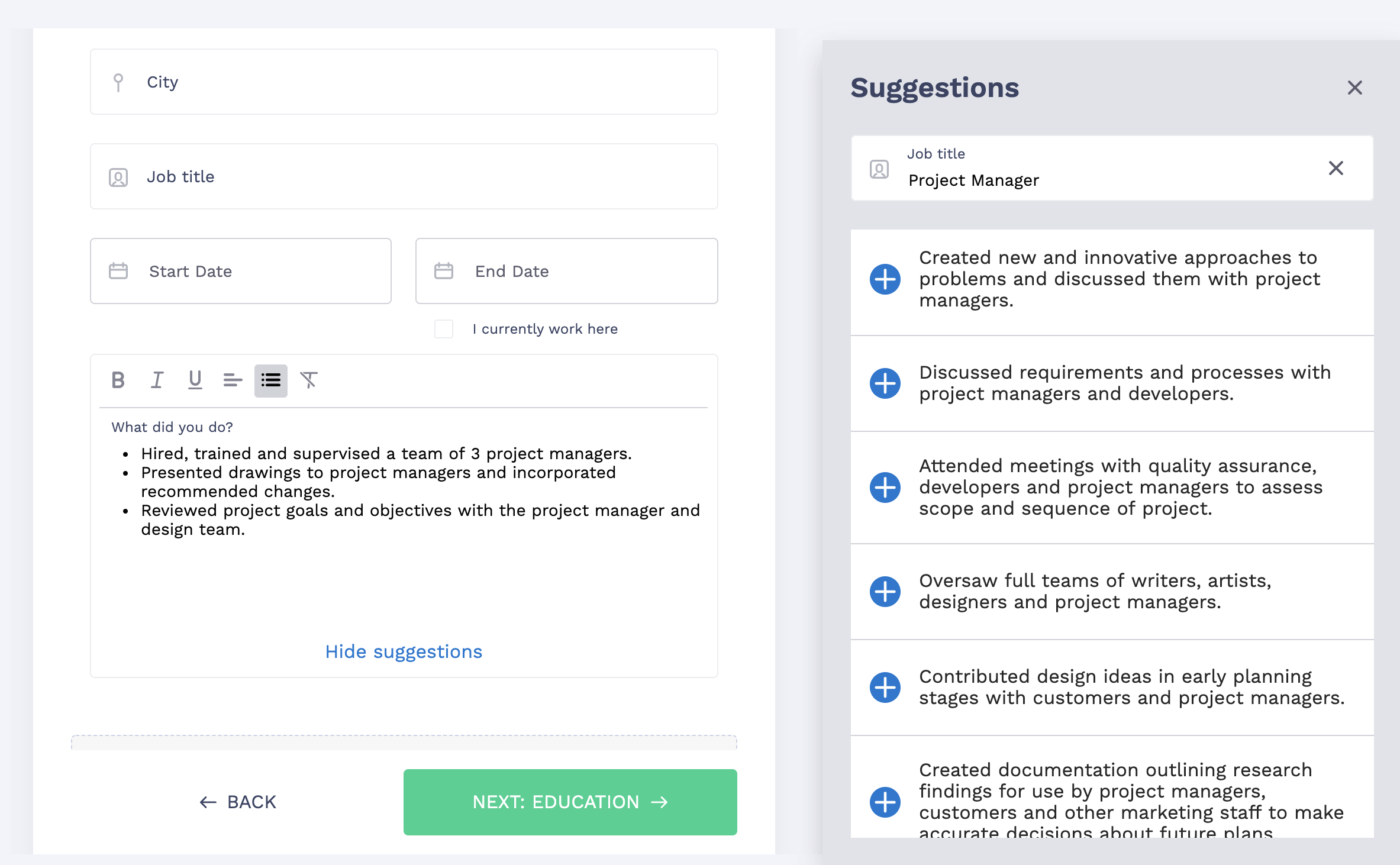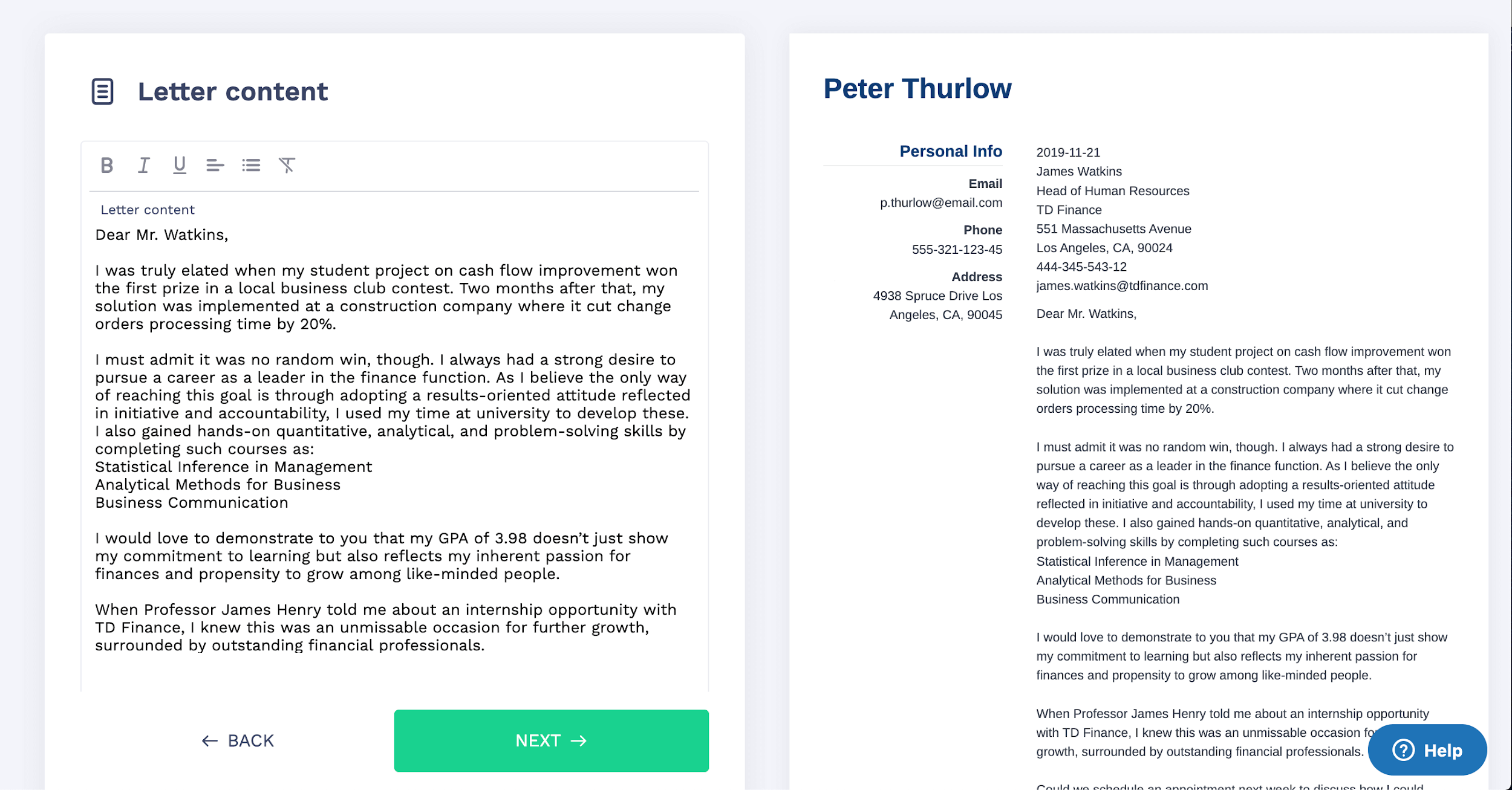
Keep Up the Good Workspace
What workplace features are the most beneficial to employees? We surveyed over 1,500 employees about their perceptions of workspaces and various amenities.

Bart Turczynski
Career Expert
You know that soft skills are a necessity in this day and age. But which ones matter in your profession? Are any of them in demand? Is there a point in adding them to a resume?
This article explains it all. Start learning about soft skills for a resume now.
In this guide:
Save hours of work and get a job-winning resume like this. Try our resume builder with 20+ resume templates and create your resume now.

What users say about ResumeLab:
I had an interview yesterday and the first thing they said on the phone was: “Wow! I love your resume.”
Patrick
I love the variety of templates. Good job guys, keep up the good work!
Dylan
My previous resume was really weak and I used to spend hours adjusting it in Word. Now, I can introduce any changes within minutes. Absolutely wonderful!
George
Want to learn more about skills for resumes? Check these articles:
Deiondre Louissaint
Exhibition Manager
deio.louissant@email.com
(123) 987-9876
linkedin.com/in/deiondre.louissant
Motivated exhibition manager with 5+ years of experience. Eager to coordinate temporary shows at the Avalon Art Museum while cutting overhead costs and achieving all project goals. Successfully led a gallery project worth $350,000 within established timeframes while reducing expenses by 11%.
Work Experience
Exhibition Manager
Avalon Gallery, Laguna Beach, CA
January 2017–present
Key responsibilities:
Key achievement:
Gallery Assistant
Emerald Gallery, Oceanside, CA
January 2014–December 2016
Key responsibilities:
Key achievement:
Education
Bachelor of Arts in Anthropology
California State University San Marcos
September 2009–May 2013
GPA: 3.88
Extracurricular activities:
Skills
Certification
Volunteer Work
Soft skills are personal qualities and abilities that affect your work performance and interaction with coworkers. In contrast to hard skills, soft skills are not job-specific. As they’re highly desirable by employers, it’s worth knowing how to list soft skills on a resume correctly.
Soft skills are unique because they can’t be learned through traditional training methods. Books, courses, or schooling aren’t enough to develop them, as they require interaction with others.
For many years, soft skills were not deemed essential for all professions. Of course, they were expected from teachers, therapists, social workers, and customer assistants. But nowadays, they’re a part of every job imaginable.
Why?
It’s because well-developed soft skills not only help to work with other people but also make you more resilient. Research has shown that training focused on developing specific soft skills can lead to a long-term productivity boost. Sadly, the prevalent schooling system doesn’t put enough emphasis on developing them, which leads to a skills gap in modern workplaces.
I will talk about how to improve soft skills later on in this article, but for now, let’s focus on examples of soft skills for resumes.
It’s hard to pinpoint the exact number of soft skills. However, some of them are more desirable than others. Below, you can see the 10 essential soft skills to put on a resume that are important for any workplace.
Adaptability helps you adjust to changes in the workplace. This soft skill makes it easier to manage disruptions in the workflow, unexpected situations, interruptions in schedules, and other events that can potentially cause stress. A person who is highly adaptable can easily deal with changes and accept new ways of working.
Adaptability skills include:
Working with others is unavoidable. No matter if you’re in a corporate environment, or you’re a freelance artist—you need collaboration skills to succeed. These soft skills help you find common ground with business partners or clients, help you accept other people’s points of view, and value other people’s input.
Examples of collaboration skills include:
Communication is a skill that people take for granted. But the truth is, many people have problems expressing themselves clearly. And that’s why these soft skills are very desirable at most jobs that require frequent communication with clients or between departments.
Communication skills examples are:
Let’s be honest—have you ever worked at a place with zero drama? Conflicts arise everywhere. Sometimes they’re over minor annoyances, but quite often they escalate to something very serious. Being able to handle such situations is a valuable soft skill.
Conflict resolution skills include:
Critical-thinking skills are complex cognitive abilities. They can help you assess situations, distinguish between fact and opinion, and solve problems in a creative way. In the era of fake news and deep fakes, they are indispensable.
Examples of critical-thinking skills include:
Similar to adaptability skills, flexibility helps you to adjust to changing circumstances. Flexibility skills can help you go the extra mile when it’s necessary. For example, a flexible employee will be able to adjust their schedule to support the business during peak seasons or will be able to handle additional duties when a colleague is on leave.
Examples of flexibility skills include:
Interpersonal skills help you to interact with other people effectively—that’s why they’re also often called social skills. They’re highly desirable in all work environments, allowing people to collaborate better.
Interpersonal skills include:
Yes—people in leadership positions need soft skills, too. It’s not just Machiavellian ideals anymore. In the 21st century, leaders are expected to motivate and inspire others. They should gain respect by setting a great example for others.
Examples of leadership skills include:
There are many tools that can make time management easier, yet it still remains a key soft skill for the modern workplace. Employers want to work with people who can organize their work efficiently.
Time management skills include:
A problem-solving attitude is priceless for employers. Individuals who can easily identify and find solutions to problems can help to boost productivity and introduce innovative ideas. What’s not to like?
Examples of problem-solving skills are:
The ResumeLab builder is more than looks. Get specific content to boost your chances of getting the job. Add job descriptions, bullet points, and skills. Easy. Improve your resume in our resume builder now.

Nail it all with a splash of color, choose a clean font, and highlight your skills in just a few clicks. You're the perfect candidate, and we'll prove it. Use our resume builder now.
Adding soft skills to a resume isn’t just about pasting a long list of them onto the document. You must be selective—use only the skills that match the job requirements. Then, include examples of how you used these skills in various resume sections.
Take a look at the steps outlined below:
Let’s start with the way you introduce yourself on a resume. Your resume profile should include some examples of soft skills straight away. No matter if you choose to write a resume summary or a career objective, it’s good to show a glimpse of the personal traits that make you a great employee.
For example, if a job offer calls for a person who is motivated and demonstrates excellent time-management skills, the profile below shows an excellent candidate:
Motivated exhibition manager with 5+ years of experience. Eager to coordinate temporary shows at the Avalon Art Museum while cutting overhead costs and achieving all project goals. Successfully led a gallery project worth $350,000 within established timeframes while reducing expenses by 11%.
The best way to include soft skills in your resume is to mention them when describing your work history. The work experience section should include resume keywords that reflect the job requirements posted in the advertisement. So if your desired company wants someone with time-management skills, collaboration, communication, and mentoring skills—the example below should inspire you.
Exhibition Manager
Avalon Gallery, Laguna Beach, CA
January 2017–present
Key responsibilities:
Key achievement:
If you’re writing an entry-level resume, adding soft skills to the education section is a great idea. You can mention them when describing your academic achievements, projects, or extracurricular activities.
Bachelor of Arts in Anthropology
California State University San Marcos
September 2009–May 2013
GPA: 3.88
Extracurricular activities:
The skill section of your resume shouldn’t be a list of random abilities that came to your mind. Tailoring it to the job ad will help you create a targeted resume.
Here’s how to craft a great skill section:
Just like in the example below:
Skills
You might think hiring managers skip the additional sections on a resume. Do you know when it happens? When the information listed there is irrelevant. Don’t make a mistake like that, and use the extra sections to highlight your soft skills.
For example:
Volunteer Work
You might’ve realized that your soft skills aren’t on point. Congratulations—being aware of the problem is a great starting point for personal development! Now, you can try various methods to work on your soft skills. Choose the one that suits you best.
Sometimes it’s difficult to evaluate your own strengths and weaknesses. That’s when people around you can help. Ask your family, friends, and colleagues for feedback. It might feel uncomfortable, but it will give you a broader perspective of your abilities.
You can ask them specific questions, such as “Should I try to improve my verbal communication skills?” or more open ones, such as “How could I make our work relationship better?”
Browsing through lists of soft skills could be overwhelming. But I’ve got good news: you don’t have to work on all of these skills all at once. That would be simply impossible.
As always, be selective—choose which skills you want to develop first. Make SMART goals. For example, instead of going for a vague “I want to be a better leader”, try “I want to get better at giving feedback to my subordinates.” Small steps are better than no steps.
That’s the easiest way to learn a skill nowadays. There are millions of online courses dedicated to all topics imaginable. Try listening to experts on YouTube or browsing through popular e-learning platforms like Udemy or Coursera. For example, have a go at the People and Soft Skills for Professional and Personal Success Specialization course to improve your communication, listening, and presentation skills.
If online courses are not for you, try other learning resources such as self-help books, blogs, or in-person coaching sessions. A popular book that can help you develop communication skills is How to Talk to Anyone: 92 Little Tricks for Big Success in Relationships, written by Leil Lowndes. You can easily find books on other topics related to soft skills by browsing through Amazon or any other online bookstore.
Many workplaces provide regular performance evaluations for employees. So why not ask your direct supervisor for feedback on your soft skills? If you both decide that it’s an area for improvement, you could also create a development plan together. There’s a chance that your company provides in-house soft skills training, so make sure to inquire about that.
Yep, I’m afraid so. There isn’t really a better way to develop soft skills than practicing. Yes, it will put you out of your comfort zone, but it will be worth it. Want to improve communication skills? Talk to your colleagues more often. Working on being more adaptable? Volunteer to try new work methods and practice staying calm when changes happen. Want to work on collaboration skills? Ask your supervisor to sign you up for team projects.
Double your impact with a matching resume and cover letter combo. Use our cover letter generator and make your application documents pop out.

Want to try a different look? There's 21 more. A single click will give your document a total makeover. Pick a cover letter template here.
Now you know everything about the importance of soft skills in the workplace.
Want a quick reminder of the top 10 in-demand soft skills? Here we go:
Have you got any questions about putting soft skills on a resume? Want to share any tips on how to develop soft skills? Let me know in the comments below!

What workplace features are the most beneficial to employees? We surveyed over 1,500 employees about their perceptions of workspaces and various amenities.

Bart Turczynski
Career Expert

“Professional development” is a vague term but one of crucial importance to employees. In this study, we investigate how to meet the professional development needs of today’s workforce.

Michael Tomaszewski, CPRW
Certified Professional Resume Writer, Career Expert
![What Makes a Nightmare Coworker? [2022 Study]](https://cdn-images.resumelab.com/pages/thumbnail_1.jpg)
The world of work is constantly changing, but infuriating coworkers stay the same. Check out how it feels to have terrible work colleagues.

Agata Szczepanek
Career Expert